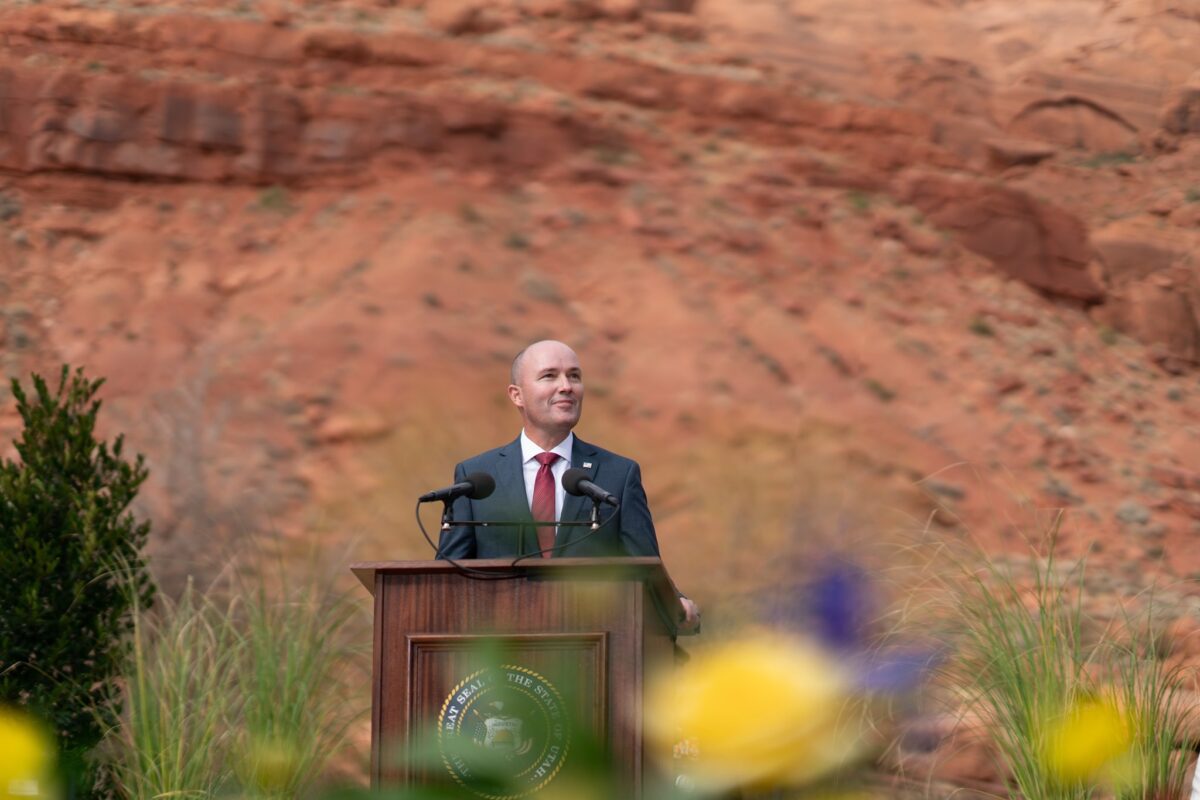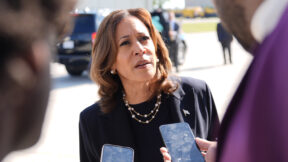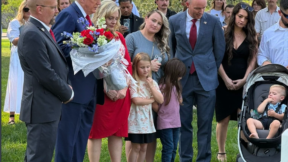GOP Utah Gov. Vetoes Bill Banning Trans Athletes in School Sports: These Kids ‘Have a Place in Our State’

Photo via Spencer Cox on Facebook.
Gov. Spencer Cox (R-UT) earned widespread praise for a letter he wrote detailing his reasons for vetoing a bill that would ban transgender athletes from participating in middle school and high school girls’ sports, especially for a section in which he expressed his “love” and support for transgender students.
In the letter, Cox acknowledged that “[p]olitically, it would be much easier and better for me to simply sign the bill,” but he felt that he had to do “what I feel is the right thing regardless of the consequences.”
I know most won’t read past a headline but please read my veto letter—especially if you disagree with me. The veto will be overridden on Friday and then we will have a special session to fix a few things. Trans sports is a terribly difficult issue. Please be kind to everyone. 1/ pic.twitter.com/5991MF2xqa
— Spencer Cox (@SpencerJCox) March 22, 2022
2/ (last page) pic.twitter.com/68a1hUhQr5
— Spencer Cox (@SpencerJCox) March 22, 2022
Cox noted Utah’s past history of “trying to approach complicated issues in ways that bring collaboration and fairness.” The Republican-dominated state government made headlines in 2015 for passing a law banning discrimination based on sexual identity and gender orientation in housing and employment, but with exemptions for religious institutions and their affiliated entities like schools and hospitals. The bill earned support from both Republicans and Democrats, and LGBTQ groups and the Church of Jesus Christ of Latter-Day Saints.
This experience led Cox to feel “heartened and encouraged” to see legislators cooperating with LGBTQ advocates “to work on a compromise that would both protect women’s sports and allow some participation for our most marginalized transgendered youth.”
But instead, he wrote, HB11, Student Athletics Participation, had “fundamental flaws and should be reconsidered.”
Chief among the reasons for Cox’s veto was his frustration over an 11th hour amendment to the bill that implemented a complete ban on transgender athletes participating in any girls’ sports at the middle or high school level, instead of the compromise that had been publicly debated during the timeline of the bill’s progress through the legislature.
The previous version of the bill would have created a commission to make determinations for individual athletes’ ability to participate. As Cox described it:
As you know, the negotiations centered around the potential compromise of a commission of experts that would help decide on an individual basis which kids would be able to participate. The concept was fairly simple. For the very small number of transgender kids who are looking to find a sense of connection and community–without posing any threat to women’s sports–the commission would allow participation. However, the committee would prohibit participation in the rare circumstance of an outlier who could pose a safety threat or dominate a sport in a way that would eliminate competitive opportunities for biological females.
“It is important to note that a complete ban was never discussed, never contemplated, never debated and never received any public input prior to the Legislature passing the bill on the 45th and final night of the session,” Cox continued.
He also argued that the bill, as currently written, would impose a “real risk of insolvency and bankruptcy” on the Utah High School Athletic Association and local school districts across the state because they “will inevitably get sued under this bill.” The legislation “provides no financial protection” for UHSAA or indemnification for the local school districts, Cox pointed out, “only an explicit invitation for a lawsuit.”
“I hope you can agree that if we want to protect women’s sports, bankrupting the institution that is responsible for their participation is a bad place to start,” he wrote.
Cox closed his letter with an emotional discussion admitting that he was “not an expert on transgenderism,” but when in doubt, “I always try to err on the side of kindness, mercy and compassion.”
He then cited several statistics showing that out of 75,000 high school kids participating in high school sports in Utah, there were only four who were transgender, and only one who was playing girls sports. Additionally, 86% of transgender youth reported suicidality and 56% had attempted suicide.
“Four kids and only one of them playing girls sports,” he wrote. “That’s what all of this is about.” He described those four students as not “dominating or winning trophies or taking scholarships” but “just trying to find some friends and feel like they are a part of something” and “trying to get through each day.”
He continued:
Rarely has so much fear and anger been directed at so few. I don’t understand what they are going through or why they feel the way they do. But I want them to live. And all the research shows that even a little acceptance and connection can reduce suicidality significantly. For that reason, as much as any other, I have taken this action in the hope that we can continue to work together and find a better way. If a veto override occurs, I hope we can work to find ways to show these four kids that we love them and they have a place in our state.
The Utah Legislature passed the bill with enough votes to override a veto, and Utah Senate President Stuart Adams tweeted a statement indicating his intention, along with Utah House Speaker Brad Wilson to call a veto override session on Friday.
We must work to preserve the integrity of women’s sports. Finding a solution to this complicated issue is necessary to maintain fair competition now and in the future. #utpol pic.twitter.com/YnUbGMD08J
— President J. Stuart Adams (@JStuartAdams) March 22, 2022
Cox’s letter earned accolades on social media, with many Twitter users specifically highlighting his accepting message to the four transgender athletes in the state.
Reading this letter is worth your time as it shows that we can treat with humanity those with whom we disagree, that we can center the humanity of the most marginalized even if we do not fully understand. https://t.co/KBbZEUjjvg
— Ida Bae Wells (@nhannahjones) March 23, 2022
“When in doubt I always try to err on the side of kindness, mercy & compassion. I also try to get proximate & I’m learning so much from the trans community.”
If we had more lawmakers actually talking to the people who will be impacted by a law & then treating them as human… 🤯 https://t.co/R8XI19eKxD
— The Chris Mosier (@TheChrisMosier) March 23, 2022
Utah’s Republican governor strikes a remarkably different tone from @GovRonDeSantis on this issue:
“I always try to err on the side of kindness, mercy and compassion.”
DeSantis yesterday: The NCAA is trying to “destroy” women’s athletics by allowing “basically men” to compete. https://t.co/6iGUeJbYBx
— Lawrence Mower (@lmower3) March 23, 2022
It’s really worth your time to read this letter — especially the last page, in the governor’s second tweet. https://t.co/5mPuv6jmyM
— Kevin M. Kruse (@KevinMKruse) March 23, 2022
If decency mattered in Republican politics, Spencer Cox would be a rising star and a 2024 contender. Instead, this will hurt him. https://t.co/0yCc3vhUij
— Radley Balko (@radleybalko) March 23, 2022
I think this is one of the best things I’ve read from an elected official in years. It is pragmatic, but also compassionate, about the difficulties of allowing people to file lawsuits over trans athletes. https://t.co/Aejq2GM2JA
— Andrew Fleischman (@ASFleischman) March 23, 2022
Thank you for understanding. As the parent of a transgender teen who has attempted suicide and just want to be accepted and make friends I can’t tell you how important and true your statement is. Nice to see at least 1 Republican politician who gets it. Thank you.
— Alan (@JudahTheHammer) March 22, 2022
This is far from perfect. And I agree with many of the critiques I’ve read that it still surrenders so much ground to transphobes. But it also is the only example I’ve seen of any GOP official giving the slightest bit of concern to facts in this “debate”. https://t.co/zO2zZNNGFY
— Ben Steele 🌈 repeal the 27th Amendment (@blsteele17) March 23, 2022
Have a tip for us? tips@mediaite.com






